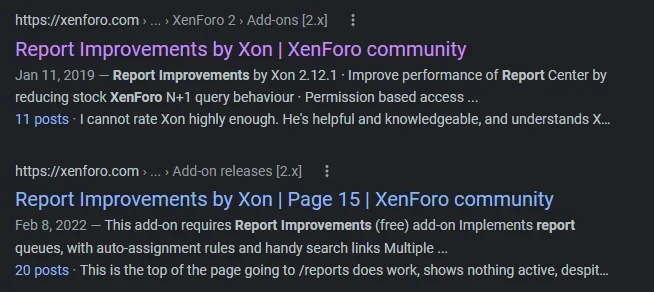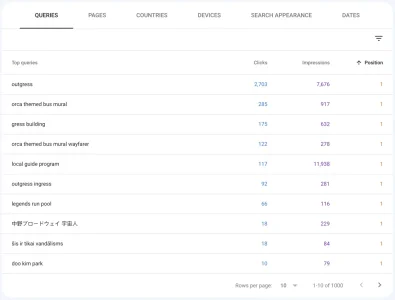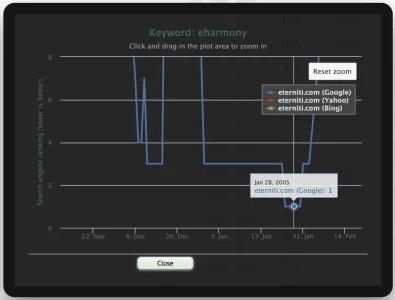alternadiv
Well-known member
If you have a page node or help page (not a forum thread) that appears first in a Google search, I'd like to see the page and the search keywords, if you don't mind sharing here or messaging it to me.

Good point. I'm currently using resources to create a wiki. After considering all options, I think a modified resource manager is best for me.But for other uses (resources used as a wiki, help pages, page nodes, etc.), it might have more to do with how visible the pages are. Are resources only listed in the resources area, or are they linked often elsewhere in the site?
I've had a lot of problems with people not knowing how to find the content they're looking for, when it's on a page. Hopefully the resource manager will help a little bit.Page nodes I've found tend to fly under the radar. I used to have one forum's rules and policies as a page node and nobody could ever find it, despite it being displayed at the bottom of the node list on the main page of the forum.
While I don't really use page nodes for anything, it's easy enough to see where your average position is for search terms in Google Search Console. At this point in time, I wouldn't worry about trying to format the page for the search engine, just do it for the end user and the rest will come.If you have a page node or help page (not a forum thread) that appears first in a Google search, I'd like to see the page and the search keywords, if you don't mind sharing here or messaging it to me.

Since it can be better organized, I think it's a good means of presenting information.I've had a lot of problems with people not knowing how to find the content they're looking for, when it's on a page. Hopefully the resource manager will help a little bit.
I thought of trying the same, and bought a license specifically for that... And discovered that Resource Manager is too limited to really make much great use of.Good point. I'm currently using resources to create a wiki. After considering all options, I think a modified resource manager is best for me.
I've had a lot of problems with people not knowing how to find the content they're looking for, when it's on a page. Hopefully the resource manager will help a little bit.
Yeah... Though apparently pointing out that SEO isn't a silver bullet of success pisses off all the SEO expertsWhile I don't really use page nodes for anything, it's easy enough to see where your average position is for search terms in Google Search Console. At this point in time, I wouldn't worry about trying to format the page for the search engine, just do it for the end user and the rest will come.
An older XF 1.5 site as an example:
View attachment 269291
SEO is a lot different now than it used to be. Google is pretty smart these days. You literally would need to go out of your way to try to "unSEO" your page if you wanted to go that route.Yeah... Though apparently pointing out that SEO isn't a silver bullet of success pisses off all the SEO experts.

I've always thought the SEO industry is something of a sham, since it is all guesswork (Google doesn't divulge their algorithms), and Google keeps changing the rules. I managed to help a long-time client when we found her site had slid from a top ranking for the products she sold (where she even surpassed the manufacturer's site), to falling "below the fold" and having her business drop off substantially. I didn't use any tricks, but did revamp the code following best practices and we got the ranking back in the top three after several months.Yeah... Though apparently pointing out that SEO isn't a silver bullet of success pisses off all the SEO experts.
These words are to be carved in stone. I fully agree with this idea.SEO is a lot different now than it used to be. Google is pretty smart these days.
SEO is a lot different now than it used to be. Google is pretty smart these days.
With the algorithms of semantic analysis, Google has long preferred content written for humans and not that aimed at robots.
Avoid the following techniques:
- Automatically generated content intended to manipulate search rankings
- Participating in link schemes
- Creating pages with little or no original content
- Cloaking
- Sneaky redirects
- Hidden text or links
- Doorway pages
- Scraped content
- Participating in affiliate programs without adding sufficient value
- Loading pages with irrelevant keywords
- Creating pages with malicious behavior, such as phishing or installing viruses, trojans, or other badware
- Abusing structured data markup
- Sending automated queries to Google
I could debate the point that content on some of my forums is actually useful...If you have original content that is useful to real humans, you'll rank well.
Aren't "doorway pages" essentially what we used to call landing pages back in the day? Seems they define it similarly. If my client had a brand as one of her major lines, a landing page featuring that brand would, in the past, probably have helped the search ranking. (It would have been a page with the latest product releases featured, or news of a closeout sale on older products in that brand, etc.) Yet it would have led to the same online catalog on the same site.
I could debate the point that content on some of my forums is actually useful...But I do agree--if Google can weed out the many useless sites I visit, that's all for the greater good.

Wouldn't it mostly depend on the content you put on those pages?This thread of mine is almost a year old but I'm bumping to see if anyone has something to add.
If you use XF page nodes, how do they rank with Google?
If you use custom pages using the built in Help pages system, how do they rank?
If you use article nodes to create pages, how do those rank?
Any other wisdom to share?
We use essential cookies to make this site work, and optional cookies to enhance your experience.